#female class consciousness is not transphobia
Explore tagged Tumblr posts
Text
ok the thing that gets me about transandrophobia is that the point of intersectional labels is that they describe when a significant intersection of social classes creates a separate class. transmisogyny isn't just what happens when a person is subject to transphobia and misogyny at the same time, its a description of the significant and distinct nature of effeminacy and transfemininity in the cultural consciousness and the material class this creates for such people. transandrophobia isn't a bad concept because it presumes anti-masculinity to be real (although thats also stupid) or because it's trying to be a direct complement to transmisogyny (although this is related): it's a bad concept because it asserts that theres a distinct class experienced by trans men.
people saying "there are no unique experiences to being a trans man that trans women don't also experience" are being clumsy and imprecise but are working toward the same conclusion. there absolutely are experiences that are naturally unique to being transmasculine (although less than people seem to imagine), and there is a cohesive character attributed to transmasculinity (and female masculinity) in the culture that is used to dismiss or denigrate transmasculinity, but there is no cohesive class experience exclusive to transmasculinity. that's the difference. thats the point
#transmisogyny#i don't think ive seen anyone i follow say this although like i said i think A LOT of people are working from a vibe of this understanding#sooo anyway. if you agreed with this i think it would be nice if you would reblog it.
39 notes
·
View notes
Note
Speaking of the Pussy Hats... I was 13 when the Women's March happened, and my mom was one of the first to start making Pussy Hats because she was well known in knitting circles & was offered some kind of platform. She asked me if I wanted to be an ambassador for it (I can't exactly remember the details of what that meant), but I said no because I thought they were transphobic. It's so sad in retrospect. I felt uncomfortable already at the March because of all the uterus symbolism and female-centric slogans. I was isolated from my own sex class. It's so ridiculous considering the reason women started wearing pussy hats was because trump SAID "grab her by the pussy". Not by the "front hole" or whatever. Ugh. I feel so regretful and stupid.
you were 13!! even just the fact that you were tuned into everything is impressive. when I was 13 I cared more about sharing naruto memes on ifunny. your mom sounds cool as hell though. and you are spot on about being isolated from your sex class. it’s an intentional isolation. misogynists on both the right and the left have a vested interest in breaking apart female solidarity and preventing female class consciousness.
in the case of the women’s march, accusations of transphobia broke apart the ability to discuss trump’s misogyny in any meaningful way, and that was the thing that brought women together for the march in the first place. it’s by design. and it plays on the female socialization to self-deprecate and self-flagellate and concede our points in the face of those accusations. at 13 I’m not surprised you fell into it. there are so many fully grown women out there who happily throw their fellow women under the bus to try and prove their own virtuousness.
6 notes
·
View notes
Note
Before I follow I do have to make sure you're ok with trans people, I love your blog but I'm so scared of transphobia and homophobia in occult spaces, just gotta check!
This will be somewhat of a long-winded response but I don't think I can answer this simply.
I don't consider myself a transphobe; I have trans acquaintances & follow trans bloggers. I don't think it wise to completely shut out a group of people even if we see things differently. My current views are colored by the time in my life that I identified as trans and socially transitioned for about 4 years (agenderflux, to be specific). However, I have since desisted in the last 2 years or so. Through much contemplation & introspection, I'd realized I believed I was trans because I never quite fit the description of what it was to be a woman in society. I was/am largely gnc. My family threatened to disown me for my bisexuality & it was easier to believe an aspect of myself must be masc/a man in order to reconcile my feelings for the same sex. Growing up steeped in patriarchy led to internalized misogyny & biphobia deeply buried within me. In the end, I came to realized no one could tell me what it is to be a woman except for my own experience of being born female. This is a significant reason why my blog and spiritual practice is woman-centered; by understanding God as the Divine Feminine, it has allowed me to embrace & reclaim what it is to be born a woman.
I respect trans folx, I will always use your pronouns & treat you with decency. The issue I have with the trans movement is when they aim to erode female class consciousness ("trans women are women" & denying us the language to speak of our oppression) & our freedom to create female-only spaces. If you don't respect my autonomy, I don't respect you.
No matter your sex, every person contains both feminine and masculine energy. I ask that trans people be critical of what they identify as being woman/man, & to not confuse that with being fem/masc.
Follow me if you'd like. I just warn that you may find the contents of this blog does not use trans-inclusive language. For when I speak of woman, I mean biological female.
2 notes
·
View notes
Note
If radical feminism considers women to be a class of people, would you call trans men class traitors?
absolutely not. the concept of ‘class traitors’ is trite because you can not betray the class you belong to, that’s just some bs designed to sow dissent amongst ppl who should be in standing in solidarity with each other. (ask yourself: who benefits from pitying members of one class against each other? who benefits from weakening their solidarity?)
now, here’s where we run into some trouble: classes are socio-political and sometimes biological groupings therefore an individual cannot change their class (or ‘identify’ out of it). In the case of women as a class, there is a social, political, and biological element that trans men continue to retain even when choosing to live as men. trans men continue to face the same misogyny as women with added transphobia (which one could argue is a mixture of misogyny and homophobia). for this reason women and trans men should actually be standing together to take out the patriarchy. who cares if trans men live as men rather than their assigned sex at birth, gender is fake and in an ideal world no one would be ‘men’ or ‘women’ there would only be people. but to get there, we first need to build female class consciousness because the female sex continues to be oppressed whether you’re a ‘woman’ or a ‘trans man’.
#radfem#radblr#radical feminism#radical feminists do touch#radical feminist safe#radical feminst#trans
15 notes
·
View notes
Note
(saw ur tags on the transwidow ask post, i'm the ask op) i was a libfem tra until my partner came out actually, it's what peaked me. always had trans friends growing up (ftms though) stringently believed trans women's identities had nothing to do with fetishes etc... yea. i'm 21 and bisexual so i think i fit into the younger, groomed into believing the ideology bill! unfortunately my experiences still mirror those of older women, tbh i think the only way it's slightly different is not having any other perspective i guess? as soon as i knew what 'trans' was, the ideology was already being fed to me, so i'd never had another view other than 'this should be celebrated!' i also have only ever been able to speak honestly about my experiences with people aged 35-70, which is quite alienating since my peers are all tra if not trans, which may be different for older women. i think that's what reinforces the peaking, whether women are my age or 30 or 50 or 70, our femalexmtf relationships and feelings all seem to mirror the same path. it's eery. there is literally a formula.
oh i’m soooo glad you came into my asks, i have been wondering for a long time what the femalexmtf relationship looks like for my demographic. i know you said in your ask that the experiences you outlined are all universal, i just couldn’t help but wonder what isnt. im sure there are nuances we cant see cause the younger women are just so scared to talk. theres one straight girl i know who just broke up with her trans id boyfriend and i can tell she’s terrified to speak honestly on her experience.
but isnt it crazy how being close to these people and observing their behavior is what peaks us? part of what peaked me was my tim roommate and noticing how much they downplay the fetish and objectification of women in general. i had never interacted with one irl before, just tifs irl. being familiar with tims through the positive social media portrayal sets you up to be blindsided by the porn addiction, misogyny, and complete ineptitude/refusal to do housework. older het women who aren’t already groomed will have an outsiders perspective like you said, and tims seem to have more cut out for them when it comes to selling the tra ideology (manipulation.)
it seems like if you already have the same belief system, it opens him up for some more insidious/sneaky forms of manipulation. i dont have any good examples of that its just a hunch. i feel like the trans doctrine gives them so much power through language to obfuscate the truth, which is what abusers do to keep you on the back foot. it gives them grounds to accuse you of transphobia, which might land harder for a younger groomed woman with only tra friends compared to an older non-indoctrinated woman. so i wonder if all the common female x mtf experiences you outlined in your original ask are more easily rationalized/normalized in the ideologically captured minds of women who are reaaaaallly severely manipulated by these men, causing them to stay silent longer.
i also know of a couple women who started dating a tim with knowledge upfront that he’s transitioning, but never interacted with tims outside of social media before that. i wonder if they would also count as trans widows after getting fed up with the disgusting behavior and eventually peaking? i know technically they dont fit the definition, but its still a similar experience. because the grooming starts so young, there are likely thousands of invisible young women with stories the trans movement doesn’t want to hear. thats why beyond the looking glass is such an important piece of media for the solidarity and class consciousness it generates for a group that’s so viciously silenced. and like you said the experiences are so formulaic and similar across cultures and demographics that its like a lightbulb moment to realize you’re not alone, its not just him, its this ideology.
1 note
·
View note
Text
fellow feminists, I encourage you to read the entirety of the above response to my question. It details, with great accuracy, the incompatibility of trans activism and feminism, and how it intersects with male activism. I agree with previous on this point completely, and it's important for us to see it from the horses mouth.
I would like to respond point by point.
First of course, this response starts with a personal attack on what is a legitimate question in response to the proposed problematic nature of 4b. Since deciding not to date or have sex with someone is not a form of violence or discrimination, making choices on who you date is not bigoted. Instead of addressing this, the responder makes an attack on the credibility of me asking the question, since refuting the point of course not on the table. the proper way to deal with people concerned with the bodily autonomy of women TERFs is ad hominem, since engaging with their ideas is dangerous.
The 4B movement reduces the idea of the patriarchy to men vs women, and not a systemic issue that anyone can uphold and fall victim to, regardless of gender.
Newsflash, it's BEEN men versus women since the beginning of time. This is not, and should not be news. Men being emboldened to chant "your body my choice" is only the latest iteration of a long history of oppression. Women are conditioned to be complicit in their own oppression, of course, since they are punished for not upholding societal norms associated with being a woman. It IS men versus women when women are prevented from participating in the political process by men. It IS men versus women when the vast majority of sexual assault and domestic violence is male on female. It IS men versus women when men get to bar women from healthcare. To ignore the role that sex plays in sexism directly obfuscates the issue and prevents class consciousness.
And because of that, they have very strict rules on What Is A Woman and What Is Not. News flash, it's the same transphobia and TERF rhetoric we've been fighting so hard in the states.
A definition that includes over half of the entire human population, and not the 0.5% of men who want to be included in that definition, is by no means strict. It is precise. Women are oppressed FOR being female, not for identifying with it. Trans men are oppressed for being female. Women are raped because of who we are, because of our bodies, and because rape against women is something a man is rarely punished for. Women are denied access to schools, to jobs, to positions of legitimate power based on their sex. Not because of some mystical femininity we possess.
There can't be a trans-inclusive version of this movement because to do so, you need hard lines on who's a man and who's a woman. If we're excluding men, that means trans men will either get gendered correctly and marked as the enemy, be misgendered in order to be included, or the language shifts to people with uterus' versus people with penises, which is just extra steps to disguising transphobia/bioessentialism/transmedicalism.
This is 100% accurate. There can't be a trans-inclusive version of this movement, because the purpose behind this movement is to stop giving the oppressor class access to the oppressed. If we can not have class consciousness- if we can't define who is a danger to us- the entire thing loses all meaning. Men still benefit from the patriarchy even if they change pronouns. They still commit crimes against women at a similar rate to cisgender men, sometimes at a greater rate. The purpose of this movement is to protect women by removing a great source of danger- the threat of male violence.
And trans women will continue not to be taken seriously and labeled as a threat despite how vulnerable that group already is. There is no safety here.
Trans women are no more of a threat than men are. are they oppressed for gender non-conformity? in many cases, yes. However, that in no way erases the real threat they pose to women in the same way cisgender men pose a threat. Ministry of justice data from 2020 shows that of the imprisoned population, trans women were imprisoned for sex crimes 17.8 times more than cisgender women*, and similar studies show that trans women overwhelmingly follow male patterns of criminality as opposed to female ones. The fact that women are waking up to the threat men in their lives pose is long overdue, and men don't get to opt out of being perceived as a real threat just because they're oppressed on a different axis.
*source
You also have to think about what happens next. The, "Then What?". What changes will it bring, how will it end the patriarchy? So you're not interacting with men anymore - To what end?
There are so, so many ways this benefits women, but I'll name a few.
More than half (51.1%) of female victims of rape reported being raped by an intimate partner.*
Around 1 in 10 women (9.4%) in the US have been raped by an intimate partner.*
Around a quarter of women (24.3%) are the victim of severe physical violence by an intimate partner.*
Two-thirds (66.2%) of female stalking victims were stalked by current or former intimate partners.*
*source
the vast majority of these cases are men against women.
The list goes on, and on.
This isn't some meaningless political statement. This is a matter of safety. Sometimes, a matter of life and death.
What happens to society if you exclude 50% of a population, indiscriminately, over something they have no control over?
Not dating or having sex with men is not discrimination, it is women holding autonomy over their lives. Would you say this same thing to a lesbian? To an asexual woman? 4b does not say you can't be friends with or have meaningful friendships with men. It does not mean reject them from positions of power, it does not mean diminishing the way they benefit from their position in the social hierarchy in any way other than refusing to be intimate with them. This is not violence, this is peace and safety for women.
But as an individual, it's easy for these people to say, "too bad! They deserve to suffer!"
Men will say this, loudly, publicly, about women and no one bats an eye. Men can scream "your body my choice" and yet women are the unreasonable ones for deciding to not share their intimate life with them? Especially when they have a 10% chance of being raped by them? A 24% chance of being severely physically abused by them? Women HAVE been suffering. Men being unable to find a date is NOT suffering in any way we should care about in comparison.
And if you actually are trying to break free of the punitive system of justice, if you actually want to work towards restorative justice and leave behind the Incarceration State of Mind, then you need to take a step out of your individual point of view and do what's best for the community as a whole.
Women have been told since the beginning of time that what we need to do is do more for men, change for them, deal with them, not give up on them. This is an incredibly regressive point of view. It is not, and never is a woman's job to put herself in the situation of potential abuse in order to make an individual man (or men as a collective) happy. Women doing what's best for the community starts with herself; how can she pour from an empty cup? How can she find the energy to volunteer if she's being beaten at home? If women as a whole focused on uplifting themselves more instead of men, we would see the community be uplifted as a result.
It's not your job to fix every fuck ass dude who comes along TO AN EXTENT.
To an extent? It's NEVER a woman's job to fix a "fuck ass dude". ever. for any reason whatsoever. I don't care if that fuck ass dude is her son. Women need to go beyond not fixing fuck ass dudes. Women need to refuse to spend time, energy, and resources on fuck ass dudes altogether. This kind of thinking is never returned from men to women, and that's by design.
And that's ok, but as a whole, we can't just give up on men and let them fend for themselves, because someone will find them and radicalize them against women further. That's what's already happening, we can't afford to make it worse!
The solution to reduce oppression is NOT by appealing to the moral conscious of our oppressors, and never has been. Women did not get to where we are by begging for scraps. The only power we have is the power we take and don't compromise on. Refusing to date or have sex with men is a completely non violent form of retaking our power, and it is an incredibly beneficial and effective one. It is not the onus of the oppressed to prevent their oppression by being nice to their oppressors. Men are becoming more radicalized because of women having more rights. That does NOT mean we back down on those rights. That means we keep ourselves and our sisters away from threats as effectively as we can. That means not putting ourselves in situations where we are in danger of being raped, abused, and degraded.
There's nothing wrong with being choosy about who you date/sleep with/marry/have kids with. Be choosy about who you're friends with! In most cases I think it's best to be. But if you think you're gonna avoid toxic relationships, abuse, misogyny, etc by changing your only metric to Women™️, you're gonna fail. Personal choice is one thing, activism is another.
It's absolutely possible for a woman to stop dating an abusive man and start dating an abusive woman. The difference is that it's not nearly the amount of risk as dating a man, and women are substantially less likely to be violently sexist in the way men are.
Sorry if this is rambling, but I'm scared, I'm depressed, and I'm pissed off. It hurts to see people I know care about queer people and community building forget the dog whistles and fall into cultish radical groups.
We're all scared, depressed, and pissed off. The United States just elected a misogynistic rapist into office. Republicans have the majority, and we have some very scary changes coming up ahead. ESPECIALLY in this climate, keeping ourselves safe is paramount. 4b is not violence against men, it's not even radical. It's the sane response to seeing how much danger you're in as a woman in America. Feminism is demonized on the right and the left, because there's no class consciousness among women, there's no awareness of our shared experiences, and thus there can not be mobilization for change on any meaningful scale that doesn't have the approval of men.
People like prev will do the most to say that anything that hurts men is bad. 4b DOES hurt men. That's the whole fucking point. Women are continuously drained of time, resources, emotional labor, unpaid labor, to the benefit of men. Men being forced to carry their weight is a natural consequence of women deciding not to deal with them, and it's something that they absolutely will whine and complain about. Women do NOT need the message that they should worry more about men's well being, women need the message to prioritize themselves and their safety. That's what 4b is about, and that's why you will see many people in the coming days like prev who talk about how awful it supposedly is.
and American women i am being SO serious when i say we need to learn from our South Korean sisters and follow their steps with the 4B movement. the house of representatives, the senate, the supreme court, and the president are ALL red now. if american men want to control our bodies and choices so much then let’s give them HELL!

read about the 4B movement:
2K notes
·
View notes
Note
Have you noticed that a big part of the unconditional support transactivism receives from women despite this movement being built on misogyny is because many MANY so called feminists don't want to actually acknowledge male supremacy? They eventually will criticize/oppose to one or another sexist event (like the abortion ban in USA) but as time goes on, they just forget it and even manage to despolitize them. Now, reproductive rights isn't an integral part of women’s rights anymore, it's “queer/lgbtqia+ rights”, “bipoc with vaginas rights”, etc.
But nothing makes it more obvious than the fact that women(even black/indigenous women) easily accepted they're “cis” - implying they have privileges for their womanhood not being denied - which is laughable because how being “acknowledged” as women is a privilege when to be a woman - specially a woc - in a misogynistic world is oppressive? The acceptance of the infamous “cis” also implies that both men and women are equally oppressive towards trans people, thus the analysis of male violence lost space to the more malleable “gendered violence”. By place both “cis” men and women, any observations of male patterns of violence is discouraged because it's “transphobia” (but why it would be transphobia if trans women are women like “cis women” and are targeted by men most of the time? Hmmmm) and a vile MRA rhetoric start to take place in feminism disguised as a true compromise with “gender equality”: women can be as bad if not worse than men. Women aren't victimized by male supremacy, in reality it's men who are the biggest victims. In the name of “not infantilizing women” for JUST acknowledge that misogyny exists, people are infantilizing men and giving them a free pass on their mistreatment of women.
Many so called feminists also lack sex class consciousness and they internalized all the sexist shit we have been taught by our society. So they really act that trans women are the ones who bring humanity to women's status, this is why claims like “If you don't think trans women are women, it means you think women are inferior” what is the connection between a man thinking he is a woman because he identity as one (whatever that means) with women supposedly inferiority? Women literally carry the whole humanity! Our bodies are complexes and prepared to survival and they pull out this weak guilt tripping rhetoric and women eat this up, think the only way they can achieve humanity is through males? Pffff
Honestly, after reading The Creation of Patriarchy by Gerda Lerner(a must read to any feminist), this actual state of feminism became even more clear: men have stolen women's humanity, women's knowledge of our bodies, even the position of the creators of life, despite the fact that they can't get pregnant. The next step is stealing the womanhood itself and it isn't a random event, it's part of their colonization of females. Understanding how they operate helps us to fight back.
🙏🏽
“Cis” is the biggest pile of horse shit and my #1 source on this has always been and will always be my girl Audre Lorde. Who in the entirety of the book Sister Outsider goes to great lengths to emphasize: women can simultaneously have different lives/womanhoods (ex.black versus white womanhood, ie intersectionality) while working together against patriarchy. I think it’s funny/sad that today the white man’s “intersectionality” hates black women like me who reject gender roles and claims there is a sweeping “cis” womanhood privilege that’s so universal it automatically places all non trans “afabs” (nearly 50% of the goddamn globe) above trans “afabs” and “amabs” in status and life quality. Audre also goes to great lengths to support the statement “the master’s tools will never dismantle the master’s house” which I’ve always pretty plainly taken to mean that gender will never dismantle sexism.
You’re 💯 on these feminists who can’t deal with the reality of male supremacy. Gender framework is a sugar coat that makes things easier to cope with. I get it, sexism is pervasive and normalized as fuck and it’s scary to think about how angry a lot of men would probably get if things actually changed and they didn’t have access to female abuse as often as they do. But I’m personally also fed up with being scared and highly prefer just being pissed off back lol and trying to actively do something about changing it. They can be mad all they want, I’m not stopping until we get our humanity back fully even if it’s not within my lifetime and step #1 is naming the problem
35 notes
·
View notes
Text
dystrack/rubacava is a TERF
The overall “new name”: TBrainrot under the name “Terry”
LAST UPDATED 8/10/2022
Updates are added with the proof, under the read more.
TWs: Transphobia, suicide, cissexism, incest, pedophilia, antisemitism
SUMMARY: Dez (@/dystrack / @/rubacava / @/butchstan / @/superjayld) is a transphobic TERF by admitting it alongside sending a video of trans people committing suicide, deadnamed someone, and lied about not being transphobic to a group of mostly trans people. She has been unapologetic about her actions.
Recently, she has shown to be someone who indulges in incestuous, pedophilic, and other ships of the same immoral nature being a self-proclaimed “lolicon fujoshi extraordinaire”.
Block, avoid her, and do not give her a platform whatsoever.
Proof + more handles are under the read more.
Discord: dystrack#3302 -> jpp#3302
Instagram: @ dystrrack, @ slugfunnie
Twitter: @ rubacava3, @ dystrackarts
@ frenchcest [2/10]
@ tentativebreath [2/10]
@ TBrainrot [2/10]
Tumblr: @ wickerkingdom, @ dystrack, @ rubacava, @ butchstan, @ superjayld, @ rubacava2
Dez accidentally deleted her entire blog, but remade under @ rubacava. [12/4]
Dez remade @ dystrack [7/23 update]
Dez made an alt @ wickerkingdom [8/29]
Dez made an alt @ rubacava2 [8/10/2022]
Art Fight: @ dystrack
YouTube: dystrack
DeviantArt [INACTIVE]: @ dystrack
Mastodon: @ Tbrainrot @ baraag.net [2/10]
---
9/2/2022
Another thread + document has been made, primarily focusing on her transphobia alongside proof that Dez is the holder of all accounts listed.
As a disclaimer, the writer of the document is a proshipper / part of the proship community.
Evidence that TBrainrot is Rubacava/Dystrack
8/10/2022

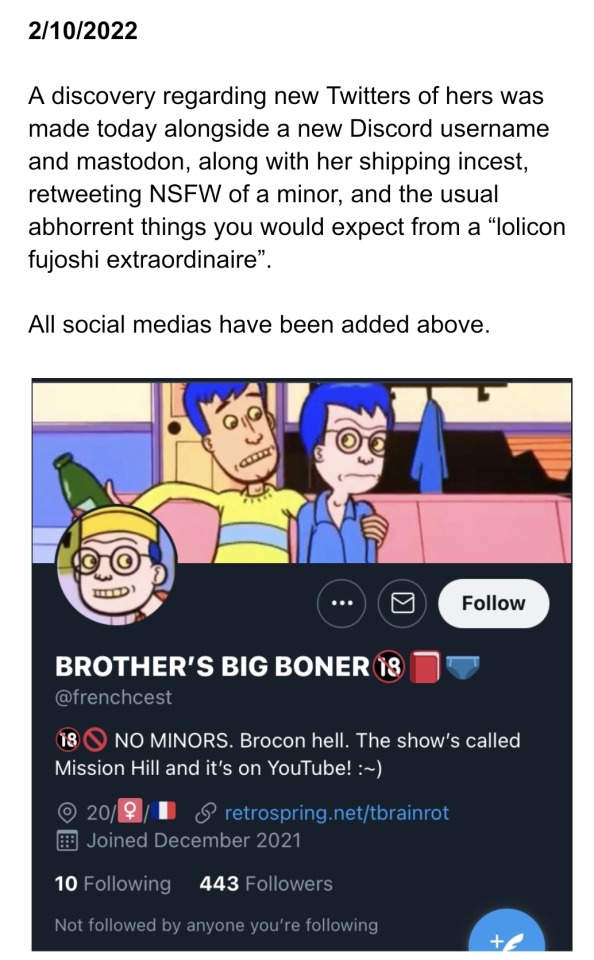
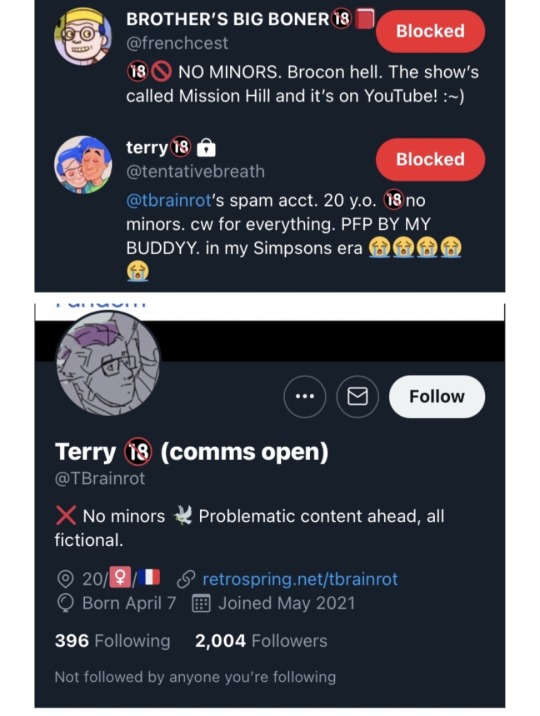
12/4/2020
Dez (accidentally) deleted all of her tumblr blogs at one point but remade under @ rubacava.
Another instance of her transphobic behavior is shown through her posting a white supremacist / antisemetic wojak meme with a transgender person hanging just off screen, captioned “Though for everyone who may check this blog yes i hate trannies <3”
A screenshot is linked here. Proceed with caution.
She has also liked a post from a TERF blog.
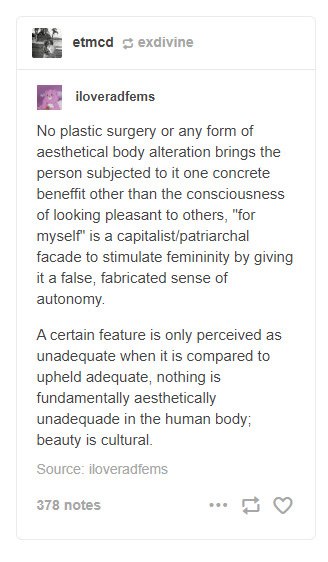
[Transcript: A blog from “iloveradfems”, saying
“No plastic surgery or any form of aesthetical body alteration brings the person subjected to it one concrete benefit other than the consciousness of looking pleasant to others, "for myself’ is a capitalist/patriarchal facade to stimulate femininity by giving it a false, fabricated sense of autonomy.
A certain feature is only perceived as unadequate when it is compared to upheld adequate, nothing is fundamentally aesthetically unadequade in the human body; beauty is cultural.”]
---
12/2/2020
J (trans male) confronted Dez (cis female) on this cissexist remark in a server.
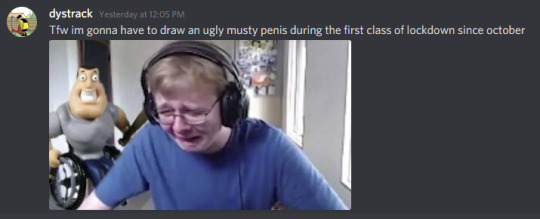
[Transcript: A Discord screenshot of Dez, saying “Tfw im gonna have to draw an ugly musty penis during the first class of lockdown since october” proceeded with a reaction image of CallMeCarson crying.]
This was brought up in DMs.

[Transcript: A Discord screenshot of a conversation between Dez and J.
Dez: I'm sorry but I don't see how my comments were cissexist? I just find penises gross and unattractive, whether theyre attached to a cis man or not.
I dont get how its cissexist because i didnt assume anyone was cis? I didnt make fun of cis men i made fun of penises which i think are gross
And not all men have penises and some trans women/amab nbs don't have penises either
J: It's more so blanket statements like that that make people uncomfortable even if you didn't have trans people in mind
even if you personally find penises gross it's kind of Ehh to joke about especially since there are some transfem people in chat
Dez: Oh.
Well they can go 41% about it.
J: What?
Dez, why would you make a joke like that.]

[Transcript continued.
J: Dez, we’ve been friends for years, what would even motivate you to make a comment so horrible? What the hell is going on with you?
Dez: I’ve been transphobic the whole time (DEADNAME)
J: I’m extremely disappointed in you Dez. I had nothing but good things to say to you and I really don’t know why you would change, especially since we've known each other for a long time. You're going to hurt a lot of people who looked up to you.
we all loved you a lot and i have no idea why you'd suddenly turn around on years of friendship to be like this but hey, I can’t control your life. If you want to be transphobic, fine. But I don’t think anyone is going to want to associate with you anymore especially not in this friend circle.
Dez: I understand that.
Hope you can find someone else to draw your homophobic fujobait porn OCs this christmas.]
J brought this up with T, and this proceeded.
[TW SUICIDE]
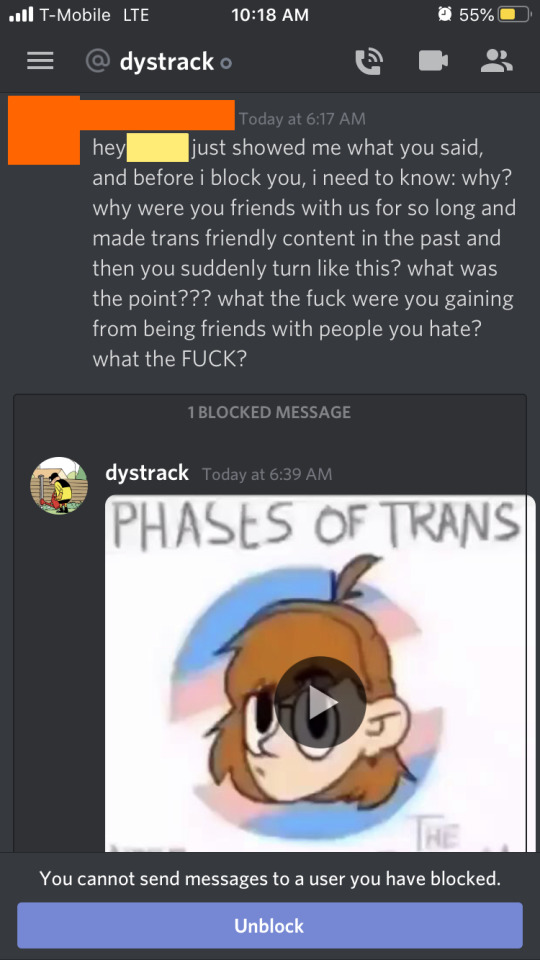
[Transcript: A Discord screenshot of a conversation between Dez and T.
T: hey J just showed me what you said, and before i block you, i need to know: why? Why were you friends with us for so long and made trans friendly content in the past and then you suddenly turn like this? what was the point??? What the fuck were you gaining from being friends with people you hate? What the FUCK?
Dez proceeds to send a video.]
Content of the video: “phase 1 being someone questioning if theyre a woman, phase 2 being that they say theyre a woman, and it cuts to a loud gunshot and a ms paint stick man having shot themselves on a table”
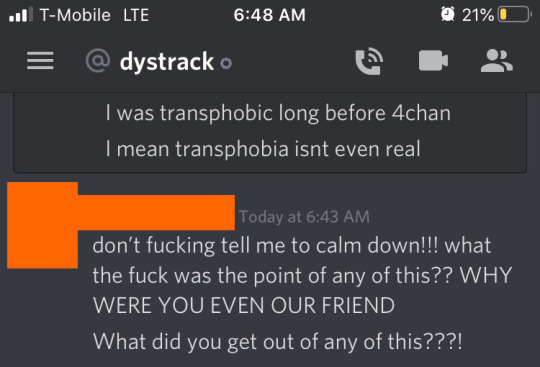
[Transcript continued.
Dez: I was transphobic long before 4chan
I mean transphobia isn't even real
T: don’t tell me to calm down!!! what the fuck was the point of any of this?? WHY WERE YOU EVEN OUR FRIEND
What did you get out of any of this???!]
A link of a google doc will be in the replies.
#callout post#callout#dystrack#rubacava#rabble rabble#transphobia#tw transphobia#cissexism#tw cissexism#suicide#tw suicide#blocklist
1K notes
·
View notes
Link
“BUTCH” HAS LONG been the name we’ve given a certain kind — that kind — of lesbian. The old adage applies: You know her when you see her. She wears men’s clothing, short hair, no makeup. Butch is an aesthetic, but it also conveys an attitude and energy. Both a gender and a sexuality, butchness is about the body but also transcends it: “We exist in this realm of masculinity that has nothing to do with cis men — that’s the part only we [butches] know how to talk about,” says the 42-year-old writer, former Olympic swimmer and men’s wear model Casey Legler. “Many people don’t even know how to ask questions about who we are, or about what it means to be us.”
Many of us wear the butch label with a certain self-consciousness, fearing the term doesn’t quite fit — like a new pair of jeans, it’s either too loose or too tight. The graphic novelist Alison Bechdel, 59, doesn’t refer to herself as butch but understands why others do. “It’s a lovely word, ‘butch’: I’ll take it, if you give it to me,” she says. “But I’m afraid I’m not butch enough to really claim it. Because part of being butch is owning it, the whole aura around it.”
What does owning it look like? Decades before genderless fashion became its own style, butches were wearing denim and white tees, leather jackets and work boots, wallet chains and gold necklaces. It isn’t just about what you’re wearing, though, but how: Butchness embodies a certain swagger, a 1950s-inspired “Rebel Without a Cause” confidence. In doing so, these women — and butches who don’t identify as women — created something new and distinct, an identity you could recognize even if you didn’t know what to call it.
By refuting conventionally gendered aesthetics, butchness expands the possibilities for women of all sizes, races, ethnicities and abilities. “I always think of the first butch lesbian I ever saw,” says the 33-year-old actor Roberta Colindrez. “This beautiful butch came into the grocery store and she was built like a brick house. Short hair, polo shirt, cargo pants and that ring of keys … It was the first time I saw the possibility of who I was.” And yet, to many people, “butch style” remains an oxymoron: There’s a prevalent assumption that we’re all fat, frumpy fashion disasters — our baseball caps and baggy pants suggest to others that we don’t care about self-presentation. But it’s not that we’re careless; it’s that unlike, say, the gay white men who have been given all too much credit for influencing contemporary visual culture, we’re simply not out to appease the male gaze. We disregard and reject the confines of a sexualized and commodified femininity.
ETYMOLOGICALLY, “butch” is believed to be an abbreviation of “butcher,” American slang for “tough kid” in the early 20th century and likely inspired by the outlaw Butch Cassidy. By the early 1940s, the word was used as a pejorative to describe “aggressive” or “macho” women, but lesbians reclaimed it almost immediately, using it with pride at 1950s-era bars such as Manhattan’s Pony Stable Inn and Peg’s Place in San Francisco. At these spots, where cocktails cost 10 cents and police raids were a regular occurrence, identifying yourself as either butch or femme was a prerequisite for participating in the scene.
These butches were, in part, inspired by 19th-century cross-dressers — then called male impersonators or transvestites — who presented and lived fully as men in an era when passing was a crucial survival tactic. We can also trace butchness back to the androgynous female artists of early 20th-century Paris, including the writer Gertrude Stein and the painter Romaine Brooks. But it wasn’t until the 1960s and early 1970s that butches, themselves at the intersection of the burgeoning civil, gay and women’s rights movements, became a more visible and viable community.
From their earliest incarnations, butches faced brutal discrimination and oppression, not only from outside their community but also from within. A certain brand of (mostly white) lesbian feminism dominant in the late ’70s and early ’80s marginalized certain sorts of “otherness” — working-class lesbians, lesbians of color and masculine-of-center women. They pilloried butchness as inextricably misogynist and butch-femme relationships as dangerous replications of heteronormative roles. (Such rhetoric has resurfaced, as trans men are regularly accused of being anti-feminist in their desire to become the so-called enemy.) Challenged yet again to defend their existence and further define themselves, butches emerged from this debate emboldened, thriving in the late ’80s and early ’90s as women’s studies programs — and, later, gender and queer studies departments — gained traction on North American and European college campuses.
The ’90s were in fact a transformative decade for the butch community. In 1990, the American philosopher Judith Butler published her groundbreaking “Gender Trouble: Feminism and the Subversion of Identity,” and her theories about gender were soon translated and popularized for the masses. In her academic work, Butler argues that gender and sexuality are both constructed and performative; butch identity, as female masculinity, subverts the notion that masculinity is the natural and exclusive purview of the male body. Soon after, butch imagery infiltrated the culture at large. The August 1993 issue of Vanity Fair featured the straight supermodel Cindy Crawford, in a black maillot, straddling and shaving the butch icon K.D. Lang. That same year, the writer Leslie Feinberg published “Stone Butch Blues,” a now classic novel about butch life in 1970s-era New York. In Manhattan, comedians such as Lea DeLaria and drag kings such as Murray Hill took to the stage; it was also the heyday of Bechdel’s “Dykes to Watch Out For,” the serialized comic strip she started in 1983. In 1997, Ellen DeGeneres, still the most famous of butches, came out. Two years later, Judith “Jack” Halberstam and Del LaGrace Volcano published “The Drag King Book” and the director Kimberly Peirce released her breakthrough film, “Boys Don’t Cry”; its straight cisgender star, Hilary Swank, went on to win an Oscar for her portrayal of Brandon Teena, a role that still incites contentious debates about the nebulous boundaries between butch and trans identity. These artists and their legacies are the cornerstones of our community. As Legler says, “This is where we’ve come from, and the folks we look back to. If you identify with that lineage, then we’d love to have you.”
LIKE ANY QUEER subculture, butchness is vastly different now than it was three decades ago — though the codes have been tweaked and refined over the years, younger butches continue to take them in new and varied directions: They may experiment with their personas from day to day, switching fluidly between masculine and feminine presentation. There are “stone butches,” a label that doesn’t refer to coldness, as is often assumed, but to a desire to touch rather than to be touched — to give rather than receive — and is considered slightly more masculine than “soft butch” on the Futch Scale, a meme born in 2018 that attempted to parse the gradations from “high femme” to “stone butch.” (“Futch,” for “femme/butch,” is square in the middle.) And while there remains some truth to butch stereotypes — give us a plaid flannel shirt any day of the week — that once-static portrait falls apart under scrutiny and reflection. Not every butch has short hair, can change a tire, desires a femme. Some butches are bottoms. Some butches are bi. Some butches are boys.
Different bodies own their butchness differently, but even a singular body might do or be butch differently over time. We move between poles as our feelings about — and language for — ourselves change. “In my early 20s, I identified as a stone butch,” says the 45-year-old writer Roxane Gay. “In adulthood, I’ve come back to butch in terms of how I see myself in the world and in my relationship, so I think of myself as soft butch now.” Peirce, 52, adds that this continuum is as much an internal as an external sliding scale: “I’ve never aspired to a binary,” she says. “From day one, the idea of being a boy or a girl never made sense. The ever-shifting signifiers of neither or both are what create meaning and complexity.”
Indeed, butch fluidity is especially resonant in our era of widespread transphobia. Legler, who uses they/them pronouns, is a “trans-butch identified person — no surgery, no hormones.” Today, the interconnected spectrums of gender and queerness are as vibrant and diverse in language as they are in expression — genderqueer, transmasc, nonbinary, gender-nonconforming. Yet butches have always called themselves and been called by many names: bull dyke, diesel dyke, bulldagger, boi, daddy and so on. Language evolves, “flowing in time and changing constantly as new generations come along and social structures shift,” Bechdel says.
If it’s necessary to think historically, it’s also imperative to think contextually. Compounding the usual homophobia and misogyny, black and brown butches must contend with racist assumptions: “Black women often get read as butch whether they are butch or not,” Gay says. “Black women in general are not seen, so black butchness tends to be doubly invisible. Except for studs: They’re very visible,” she adds, referring to a separate but related term used predominantly by black or Latinx butches (though, unsurprisingly, white butches have appropriated it) who are seen as “harder” in their heightened masculinity and attitude. Gay notes that “people tend to assume if you’re a black butch, you’re a stud and that’s it,” which is ultimately untrue. Still, butch legibility remains a paradox: As the most identifiable of lesbians — femmes often “pass” as straight, whether they want to or not — we are nonetheless maligned and erased for our failure of femininity, our refusal to be the right kind of woman.
ANOTHER LINGERING stereotype, one born from “Stone Butch Blues” and its more coded literary forebears, particularly Radclyffe Hall’s “The Well of Loneliness” (1928), is the butch as a tragic and isolated figure. She is either cast out by a dominant society that does not — will not — ever see her or accept her, or she self-isolates as a protective response to a world that continually and unrelentingly disparages her.
When a butch woman does appear in mainstream culture, it’s usually alongside her other: the femme lesbian. Without the femme and the contrast she underscores, the butch is “inherently uncommodifiable,” Bechdel says, since two butches together is just a step “too queer.” We rarely see butches depicted in or as community, an especially sobering observation given the closure of so many lesbian bars over the past two decades. But when you talk to butches, a more nuanced story emerges, one of deep and abiding camaraderie and connection. Despite the dearth of representation, butch love thrives — in the anonymous, knowing glances across the subway platform when we recognize someone like us, and in the bedroom, too. “Many of my longest friendships are with people who register somewhere on the butch scale,” Peirce says. “We’re like married couples who fell in love with each other as friends.”
Legler, for their part, recognizes a “lone wolf” effect, one in which some young queers initially love “being the only butch in the room.” In organizing the group portrait that accompanies this essay over the past months, Legler was curious “what it would be like for butches to just show up together and to be able to display all of their power, all of their sexiness, all of their charisma, without having it be mitigated in some way.” And not only for butches of an older generation, but for those still figuring things out, transforming the scene in ways that both defy and inspire their elders. “It’s been centuries in the making, the fact that we are all O.K.,” Legler adds. “That our bodies get to exist: We have to celebrate that. You can do more than just survive. You can contribute.”
45 notes
·
View notes
Text
Why Tomoyo’s Mom is a Political Lesbian
12 Days of Aniblogging, Day 1
In my Cardcaptor Sakura gushpiece last year, I made an offhanded promise to write about why Tomoyo’s mom is a political lesbian once I finished my watchthrough. With all 70 episodes under my belt, it’s time to investigate what I was grasping at there.

I will never be over Sakura’s poncho in episode 2
We hear about Tomoyo’s mom as early as the second episode of the show. After Sakura and Tomoyo make plans to break into their school at night, Tomoyo arrives with a full security escort in a tinted vehicle, with an armored van full of costumes for Sakura right behind her. You see, her mother is the president of a very large toy company, which means that she’s ridiculously rich and able to assign bodyguards to her kid like it’s nothing. The two observations that instantly come to one’s mind are that a) all of the bodyguards are women, and b) they all have the gayest haircuts imaginable.

“And here are my conspicuously butch and femme bodyguards”
The rest of Tomoyo’s family situation really only shows up in Episode 10 and 11. We are properly introduced to her mom (Sonomi), and the chip on her shoulder. She’s out to spite Sakura’s father in increasingly lavish ways, and we learn that this stems from a long-standing grudge – Sakura’s dad married the girl that Sonomi was also helplessly in love with. So that’s the ‘lesbian’ box checked off of my argument.
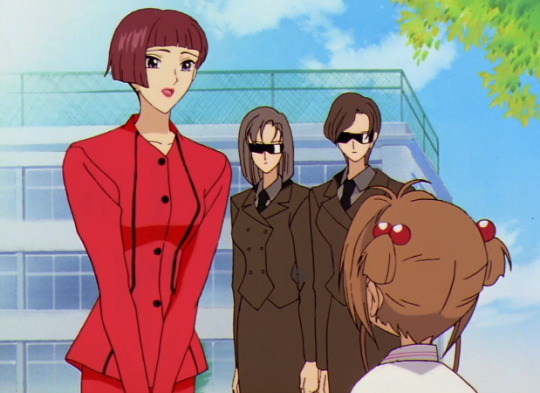
That haircut..sure is asymmetric
But what about the ‘political’ part of ‘political lesbian’? I probably should have started with that rather than Cardcaptor wiki synopses. Political lesbianism is a combination of second-wave feminist ideals with the notion that sexuality is a choice. Rather than dumping a manifesto onto you, I’ll sum up the underlying philosophical argument at play here:
1. Sexual orientation is a choice, as is choosing to act on sexual orientation. 2. Heterosexuality is inherently patriarchal and oppressive. 3. Women have an obligation to avoid and fight patriarchy wherever they can.
___________
Conclusion 1: All women should avoid heterosexuality. Conclusion 2: All women who continue participating in heterosexuality are abandoning their obligations.
This is a seriously weighty argument. If we accept all three premises, we are left with the conclusion that not only is heterosexuality harmful to women, but women must abandon straight relationships, otherwise they are actively collaborating with the enemy.
What does the world even look like if one follows this argument to its conclusion? Most political lesbians also believe in lesbian separatism – the notion that women’s liberation cannot be achieved by collaborating with men. Women ought to give up marriage, families, and sex with men, otherwise they will never be able to overcome institutional sexism. As an alternative to sex with men, women could consider…sex with women! But whether they have sex with women or none at all isn’t a big deal in the scheme of things. What really matters is the political action of refusing heterosexuality.

political lesbian praxis
The Daidouji family’s living situation all but confirms Sonomi’s commitment to separatism. She lives in a modernist mansion where all of her maids, guards, and other servants are women. Most notably, she has no husband or male partner to be seen whatsoever. Sakura even makes the observation that Tomoyo never talks about her father. Other than whatever happened for Sonomi to have Tomoyo, she appears to have completely cut the concept of men and patriarchy out of her life. If her goal was to create a lesbian separatist dynasty, she appears to have succeeded (Tomoyo is, of course, a baby lesbian in the making).
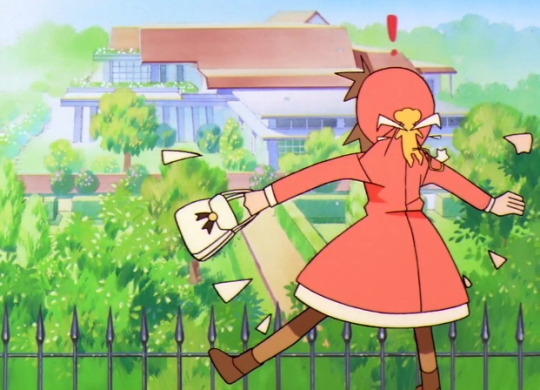
Me gaining class consciousness
There is a certain allure to political lesbianism. The idea that men are the root of all suffering and cutting ties to men provides a fairy-tale escape for some women. For anyone who has ever felt threatened or imbalanced in heterosexual relationships, it offers an explanation on top of the way out. Of course, choosing to be a political lesbian still requires swallowing some pretty big pills. Should we try?
The most challenging premise at first is the idea that sexual orientation is a choice that can and should be changed on a whim. The social construction of sexuality is definitely not a mindset that has won out. In fact, the modern gay rights movements in the United States has specifically been spearheaded with the idea that gay people are “born this way”, a purely biological challenge to the idea that someone can just decide to like women once they hear about the evils of men. Indeed, the political lesbians of old were somewhat split on whether sexuality is socially constructed or a biological impulse. However, they can just take the middle ground and argue that it doesn’t really matter – lesbian relationships may or may not be able to provide an alternative to heterosexual relationships for historically straight women, but what really matters is the political act of refusing heterosexuality. If a woman cannot bring herself to love other woman, she can simply take a vow of celibacy or otherwise avoid men. This brings us straight to the second and third arguments – that heterosexuality itself is oppressive and must be actively resisted.
Sure, patriarchy and oppression are bad, but the routes chosen to argue against them are important. Although they believe in flexible and constructed sexuality, political lesbian’s arguments against heterosexuality are extremely biological. The seminal pamphlet “Love your Enemy?” argues that “there is a very special importance attached to sexuality under male supremacy when every sexual reference, every sexual joke, every sexual image serves to remind a woman of her invaded centre...” Penetration, specifically, carries strong symbolic significance in reinforcing the power of men on top of its physically invasive component. Even non-penetrative heterosexual sex still contains that roleplay of power and powerlessness to a political lesbian. There is no loophole that will allow women to keep loving men ethically – the demands of political lesbianism are Kantian maxims.
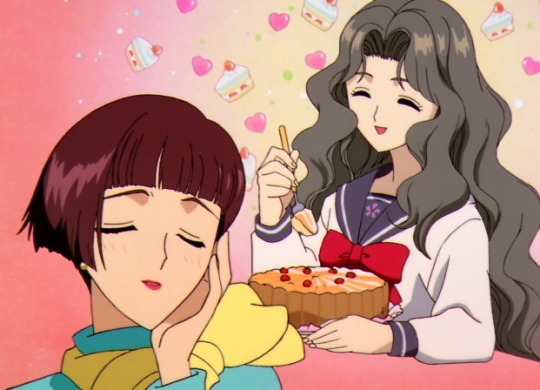
Sonomi loved Sakura’s mom to the point of viewing her pairing off with a man as a betrayal. It’s very easy to see it as an ideological betrayal on top of the personal one.
The elephant in the room is, of course, the third-wave notion that femaleness and maleness are not inherently tied to genitalia. After all, to the shock and chagrin of many a radical feminist, some women have penises. Is their sex inherently heteropatriarchal? What about men who don’t have penises? Do they have a get-out-of-jail-free card from this whole mess? What about nonbinary people, who have been completely ruled out of this conversation so far? In arguing a biological model of oppression, political lesbians will need to be able to answer for all of this.
Most of them respond by biting the bullet and doubling down on their original positions. They claim that trans women are just scheming men in dresses, that trans men are gender traitors who want to abandon their fellow women in pursuit of male privilege, and that nonbinary people are simply confused. It is through this reasoning that so many political lesbians grew up to be trans-exclusionary radical feminists. Many former members of the Leeds Revolutionary Feminist Group, such as Julie Bindel, have gradually pivoted from arguing for women’s rights on all fronts to single-mindedly becoming obsessed with making sure that trans people are forcibly excluded from all gendered spaces. Not only is it depressing to see so many radical feminists fall down this pathway, it’s terrifying to watch as TERFs gain more and more of a media foothold as they start to team up with their enemies, the religious right, over their shared hatred of transgender existence.

shut the fuck up, terf
It’s a depressing turn of events! Still, even knowing that the movement is rooted in transphobia, can political lesbianism be salvaged? The idea of women’s-only-spaces as a place for comfort, safety, and liberation still feels powerful and immediately understandable and implementable. Though the mainstream LGBT+ movement gained widespread acceptance through advocating that there was nothing they could do about their sexuality, compulsory heterosexuality is still a real thing for many women and spaces to help recognize that would be very useful. Of course, the definition of a woman is going to have to broaden to be trans-inclusive, and as recent efforts to amend the Gender Recognition Act in the UK have shown, this is very difficult in the current TERFy political climate. But I don’t think that every bit of political lesbian ideology needs to be shelved or trashed. As future waves of feminism start reigniting and reconciling various second-wave and third-wave conflicts, I’d estimate that political lesbianism is going to get a fair reevaluation amongst mainstream feminists sometime within the next decade, with the bad parts hopefully cut and the strong parts returned to public consciousness.
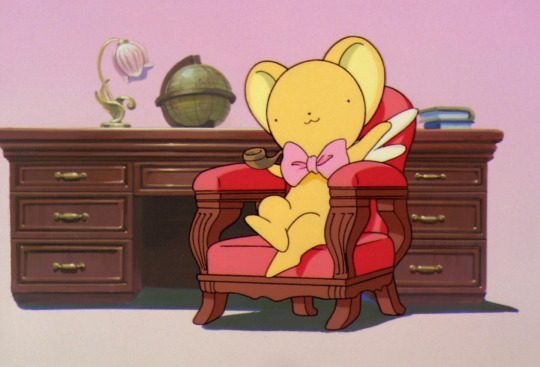
pretend kero-chan is giving this lecture ok
So where does this leave Tomoyo’s mom? uhhhhhhhhhhh
Tomoyo’s mom manages to achieve the lesbian separatist ideal of a life lived without men, but she only manages to do so by taking advantage of her vast wealth to set up her own miniature state of sorts. However, this totally goes against the radical feminist principles of grassroots organizing and class consciousness. In achieving the physical goals of political lesbianism, Sonomi has completely missed the symbolic goals of the ideology and is actually reinforcing heteropatriarchal power structures. With her vast concentrated wealth and vertical power hierarchy over her guards and maids, Sonomi is reproducing the very male supremacy power structures that radical feminists work to fight against. Though she may fancy herself a political lesbian, she probably would not be welcomed by any of them.

Also her hairstyle is still kind of bad. terf bangs, lol
#12daysofanime#12 days of anime#cardcaptor sakura#feminism#political lesbianism#sweet baby lesbian tomoyo and her ideologically compromised grownup lesbian mom
10 notes
·
View notes
Link
Radical lesbian views on hetero-bondage and anti-lesbianism
What is radical lesbianism?
Although there appears to be radical feminists who define themselves as radical lesbians and vice-versa and not everyone seems to use to the term in the same way, what I define as radical lesbianism and the way I have seen it most commonly defined is something very specific:
What most defines radical lesbian ideology is its view on hetero-bondage and anti-lesbianism, so I’m going to talk about that first. Radical lesbianism is based on the belief that ‘heterosexual’ women benefit from (compulsory) heterosexuality and thus are part of a “heteronormative” class oppressing lesbians. A concomitant belief is that heterosexual women are traitors who ‘sleep with the enemy’ or ‘collaborate with the enemy’ (men) in order to reap benefits from being with them. Despite various degrees of awareness about male oppression and patriarchy, radical lesbianism emerges from a shared contempt towards non-lesbian women and from a desire to separate themselves from such women or even from the category of woman itself.
I don’t know how it’s possible to logically believe that women can both be oppressed from hetero-bondage (by men) and at the same time be a beneficiary agent of this oppression. It makes no sense whatsoever.
Well it can only make sense if you don’t view PIV/rape and hetero-bondage as the very core of men’s domination over women, and especially if you fail to see this oppression as inherently violent. That is, if you hold a male-centred view of men’s violence against women, and especially, a liberal gay male view on heterosexuality.
The critique of “heteronormativity” comes from gay male criticism of the repression of gays and of the unfair privileges of men who benefit from heterosexuality. This means that gay men define ‘heterosexuality’ as a status that confers certain social benefits and rights which are assumed as normal and are invisible to those men who conform to it, but from which gay men are excluded and causes them to be more or less discriminated, marginalised, bullied, persecuted, etc. However rather than questioning and fighting men’s patriarchal system at the core of compulsory heterosexuality, the vast majority of gay men simply want to have the same access to the benefits and privileges that heterosexual men have, and refuse to be relegated to a second-class status. Gay men’s political agenda thus consists in pushing homosexuality into the norm, by making it more visible and also by assimilating to heterosexual male values and institutions.
Now, it’s obvious that this definition of heterosexuality doesn’t apply to women at all. Gay men define heterosexuality only according to the male experience of heterosexuality, not women’s. The norm in this society is made by and for men, and only the subjects of heterosexuality are men. Heterosexuality can only confer benefits and privileges to men, not to women, and only men can experience this as sexual or as an expression of their sexuality. This so-called sexuality is precisely how men consume and destroy women, and on what men base their global oppressive system on. To men it means sex life, status, economic benefits, paternity rights, ownership and labour extraction, but for women it means being captive to men and subjected to all forms of violence and exploitation. Hetero-bondage can’t be a protective norm or identity for women because this is how men annihilate us.
So we can see that the problem with this gay perspective on “heteronormativity” is that it doesn’t differentiate between men (those who benefit from men’s oppression and organise it) and women (those who are subjected to this oppression). It’s absurd to see women and men as equal agents of compulsory heterosexuality, and thus to see heterocaptive women as oppressive to lesbians and enemy of lesbians. If hetero-bondage is the way in which men subordinate women as a class, it means that women bonded to men have no power whatsoever in men’s treatment of lesbians and neither do we have any control over how men organise and define the different ways in which they sexually abuse and exploit us. No woman is an agent of the oppression and repression of lesbians or of any other women for that matter.
It is true that women can be anti-lesbian or anti-feminist, but it isn’t possible to treat anti-feminist or anti-lesbian women in the same way as we’d treat anti-feminist or anti-lesbian men. On one hand, the anti-lesbianism of men directly relates to their class interests of subordinating all women sexually to men and of punishing insubordinate women; on the other hand, anti-lesbianism and anti-feminism in women are direct expressions of self-hatred and psychological consequences of being oppressed by men.
To Quote Christine Delphy, translated with the help of a friend: here she writes on anti-feminism but it also applies to anti-lesbianism (just replace the word “feminism” by “lesbian feminist”):
It’s normal for women to be anti-feminist: the opposite would be surprising. And gaining consciousness, becoming a feminist isn’t a sudden and brutal revelation; consciousness isn’t acquired all at once and once and for all; it’s a long and never-ending process, what’s more, a painful one, because it’s a constant fight against all the “evidence”: the ideological worldview – and against oneself. The fight against self-hatred is never ended. Therefore there is no clear breaking point between feminist women and “anti-feminist” women, but a continuum of perspectives on a same situation. Since whatever their “opinions” are, women are oppressed. Their anti-feminism – being a) an obstacle to their awareness about their objective interests and b) their oppression directly reflected into their subjectivity – is thus one of the means of maintaining this oppression.
(In: Questions Feministes, “Our Friends and us: the hidden foundations of some pseudo-feminist discourses”, p. 35, 1977).
There’s a reason why men accuse women of anti-lesbianism and of being lesbians’ primary enemy: that’s because it’s a divide and conquer tactic, it’s meant to obscure the real enemies and oppressors – men – and to pit lesbians and lesbian feminists against non lesbian women on the more colonised spectrum. It increases men’s power over women by diminishing female solidarity and feminist vision. Radical lesbian ideology isn’t feminist, because accusing women of being traitors, collaborators or of oppressing lesbians is deep-seated woman-hatred, a reversal and denial of the reality of men’s violence against women.
The idea that women are ‘traitors’ who ‘sleep with the enemy’ comes from a very old, hateful patriarchal lie that all women are vain ‘sluts’ or temptresses who seduce and manipulate men to get what they want, especially men’s wealth. It’s also a slur thrown at adulterous women, as in women who were penetrated by other men than those they were ordained to in marriage, or other men than those chosen by the male group they belong to. Such women would be publicly shamed and punished, similarly to the women, shortly after the second world war, who were shaved and humiliated after being accused of having had affairs with the Germans, which they also interestingly called ‘sleeping with the enemy’.
What it means is that men claim ownership over women in terms of sexual access and punish women for failing to be loyal to their master / slave-owner, that is, of breaching his exclusive right to rape us. The accusation ‘sleeping with the enemy’ is based on a double lie and reversal: first, that the woman is the agent of penetration and responsible for what the man inflicted on her; second, that it’s about sex, when it’s about a man raping a woman; third, that the woman is manipulative, when it is men who continually harass and blackmail women into submitting to intercourse; fourth, that women gain economically from being raped by men, when the reality is that men loot women from tooth to bone, on top of raping and owning us.
So in a similar way, radical lesbians castigate women for sleeping with (being penetrated/raped by) other people (men) than those ordained by radical lesbians (women), instead of empathising with women and seeing that women are victimised by being penetrated and owned by men. It amounts to a similar kind of sexual objectification and blaming of women.
Finally, systematically accusing women of erasing lesbians and of lesbophobia is an intimidation tactic similar to those that accuse women of transphobia and what not.
#heterosexualidad#heteropatriarcado#gay#homofobia#lesbianismo#lesbofobia#opresión#falsa equivalencia
0 notes
Text
Kitchen culture makes organizing an uphill — but necessary — battle for restaurant workers.
I was extremely heartened to hear that the Chicago restaurant Lula Cafe is closing today in support of its workers who are participating in the general strike for International Women’s Day. As a male line cook in a small from-scratch restaurant, I think of the ridicule, stigma, and resistance I would face from owners and fellow workers alike if I were to strike today (I happened to have the day off anyway), and I can only imagine how much worse it would be if I were a waitress or female line cook.
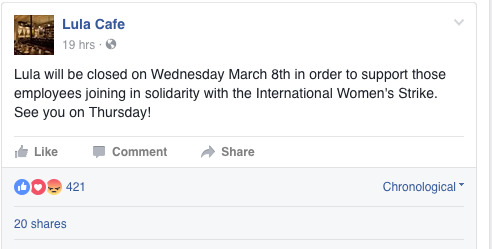
Part of what makes this industry so unique and compelling is its deep and long-established culture of discipline, camaraderie, and passionate enthusiasm. All too often, however, that culture becomes a tool used by owners and management for the exploitation of their workers. Never mind voluntarily striking — even calling out sick in a restaurant is widely considered a personal failure, as a way of letting one’s team down, when in reality it is a failure on the part of management to adequately staff the restaurant taking into account the obvious fact that human beings sometimes fall ill. Suggesting that such understaffing is unavoidable, owners constantly remind us of the tight profit margins inherent to the restaurant industry — it’s a “labor of love” — and alternately cozy up to us by making small talk about their vintage car collections.
On the other hand, owning a restaurant should be an extremely easy task for a capitalist because restaurant workers — at least serious cooks — tend to self-discipline (I think of an anecdote about a line cook who cauterized his own wound on a frying pan to keep cooking a busy service). We regard the success of the restaurant as a measure of our own artistic worth. We take masochistic pride in being overworked and understaffed: working 60–80 hour weeks leaves little time to develop class consciousness, unionize, or organize solidarity with other social movements. For this reason cooks often remain apolitical, or rather de-politicized, and frustratingly tolerant of casual racism, sexism, and homophobia in the workplace. Any resentment we might feel against the owners who extract the value of our labor is mediated by our intense loyalty to our chefs and teammates. When we sacrifice our physical and mental health, our personal relationships, our holidays, weekends, and leisure time, we think of it as a tribute to them and not as a direct deposit into the owners’ bank accounts.
Gestures like Lula Cafe’s closure today, the (moderate at best) discussions of a better kitchen culture among celebrity chefs like Rene Redzepi, and the strength of the Fight for 15 and fast food workers’ unions are important steps toward establishing social and political struggle in the restaurant. But the restaurant itself will have to undergo radical structural change if it is ever to become a livable, inclusive, and just institution for the workers who produce its value. Not only fast food workers, but chefs, line cooks, bartenders, and waitstaff must organize and form unions together. Too often the (typically gendered) division between front and back of house is an obstacle to restaurant worker solidarity which benefits only the owners. Harassment, sexism, racism, homophobia, and transphobia must be rooted out not as a matter of finger-wagging political correctness but as a matter of resisting the ongoing and historical structural violence waged by elites against marginalized groups. We should always do our best to support and establish restaurants and kitchens that are collectively worker-owned and democratically governed, where the wealth produced by our labor is distributed fairly among the workers and not squandered by owners whose only qualification is providing the capital to open the business (which simply means they happened to be rich or to schmooze with someone rich at some point).
The culture of the kitchen is deeply entrenched and, with its reverence for discipline, hierarchy, and tradition, in some ways very conservative. The struggle for socialism in the restaurant will not be an easy one by any means, but until we give it a shot our passion, artistry, livelihood and health are extracted and wasted on some car parked in the owner’s hobby shop garage.
0 notes
Note
Ok but as a trans man myself, I find Mineta’s comments towards his fellow students to be extremely uncomfortable and triggering. He may not consciously be like “Screw trans people,” but the way he reduces people down to body parts actually hurts trans people. If I attended that school, I’d probably have to wear the female uniform and I would listen every day to him making jokes like “Oh if I was Class Prez I’d make the skirts shorter” or “I wanna see all the girls’ boobies in the locker rooms.” That little trick he and Kaminari pulled to make the 1A girls dress up as cheerleaders? I would’ve fallen for it too, and I would feel extremely dysphoric and betrayed. Transphobia looks like a lot of things, and Mineta’s actions definitely do perpetuate transphobia, even if there aren’t any trans people around in canon.
I've got no idea why, but I get huge transphobe vibes from Monoma, on the other hand, I feel like despite having a garbage personality and being a garbage person I feel like Mineta would be totally cool with the LGBT+ Community in general. I've got no real reason for this and no evidence to support it, but it's just this gut reaction I've had to their characters.

621 notes
·
View notes